- About Ramapo
- Academics
- Admissions & Aid
- Student Life
- Athletics
- Alumni
- Arts & Community
- Quick Links
- Apply
- Visit
- Give
Cyber Ace Explores AI’s Impact on Humanity at Presidential Speaker Series
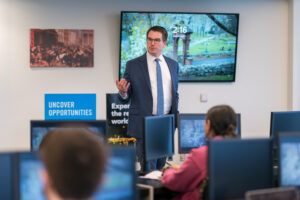
April 10, 2025
by Lauren Ferguson
As part of Ramapo College of New Jersey’s leadership on artificial intelligence (AI) – and the challenges and opportunities it will create, President Cindy Jebb welcomed cybersecurity expert Charlie Lewis to campus for the Spring 2025 installment of the Presidential Speaker Series.
Lewis, a partner and lead for McKinsey & Company’s North American Cyber and Tech Risk Service Line, protects top brands by leading cyber transformations with a focus on future-proofing, and previously developed the U.S. Army’s cyber leadership education programs.
“I see generative AI as a great opportunity and I also think that it is potentially the scariest thing and the most threatening thing to our society if we don’t use it right or use it effectively or recognize what it is capable of,” Lewis told Jebb.
He also said that he believes a liberal arts education, like the one offered at Ramapo, equips students to subdue some of the scarier parts of AI.
“I think a liberal arts education can mitigate and help prevent a lot of the scary things, whether it’s gen AI or not understanding how our system of government works and what we should work for,” Lewis said. “That is pretty important.”
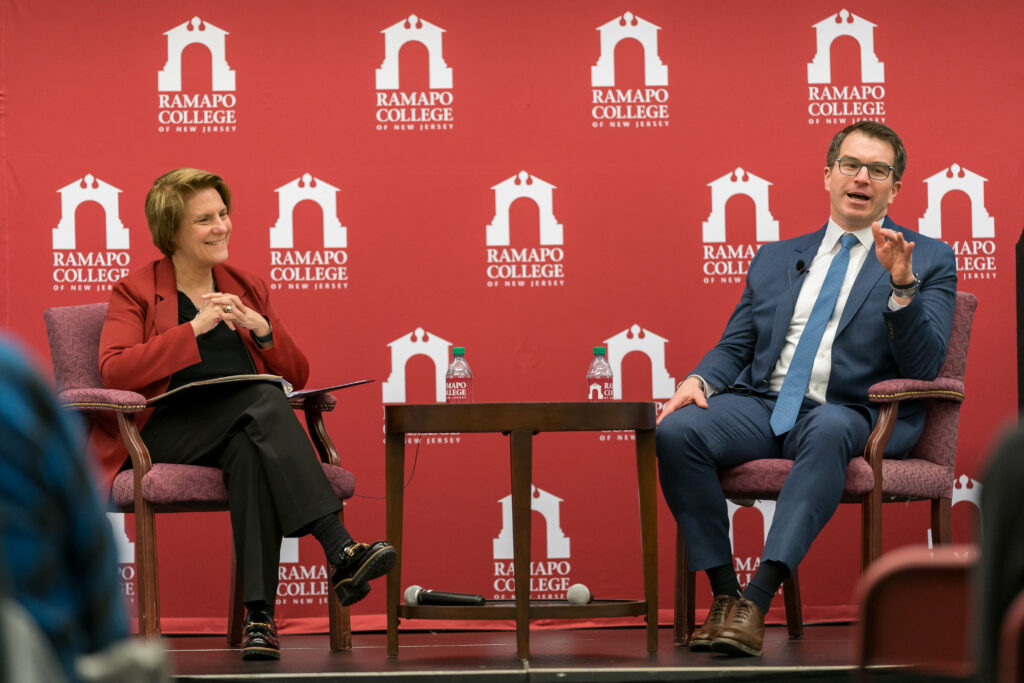
President Cindy Jebb and Charlie Lewis at the Spring 2025 Presidential Speaker Series: “Humanity in the Age of AI & Cybersecurity: An Interdisciplinary Exploration”
Dr. Scott Frees, computer science professor and the director of both the M.S. in Data Science and M.S. in Computer Science as well as convenor of the new B.S. in Cybersecurity, attended the event, and knows AI is changing work and society. He said the liberal arts promotes “the flexibility in skill development and cultural understanding it will take to succeed in a world of hyper-specialized AI agents; where that success increasingly relies on interpersonal skills, interpretation, adaptability, and relationships.”
The fireside chat and Q&A, titled “Humanity in the Age of AI & Cybersecurity: An Interdisciplinary Exploration,” was held in front of a packed audience of students, staff, faculty, trustees, alumni, and other stakeholders in the Trustees Pavilion.
During the chat, Jebb asked Lewis how he advises people and organizations to use AI as a tool “to promote integrity, social justice, and the public good.”
He said although personal bias sometimes gets coded into machine learning analysis, there are benefits, because once people are aware of the bias, it can be removed.
“You can cut some of the bias that you have with names or appearances of whatever that looks like,” he explained. He gave an example of AI rejecting minority women seeking mortgages. The company became aware, and controlled the bias, and saw better outcomes, he said.
Lewis also foresees AI being able to help predict pandemics, economic crisis, and hopefully the weather.
“But you have to test. How do we test hypotheses faster and get to better answers faster? I think that the use of AI helps us do that,” he said.
The current generation of college students will figure out how to use AI, and will see the good and the bad, Lewis said. “They will figure out when a byline is a gen AI written article versus a real journalist with some thought. They will know how to do the checks,” he said.
Still he believes students seeking to enter the tech world must be taught to think critically.
“From a professional standpoint, I believe liberal arts should supplement every technology degree that we do. Without that context, from a liberal arts standpoint, you may operate in a non-ethical or not as morally strong way,” he said.
Lewis had a full day on campus. He also participated in an intimate roundtable with about a dozen student leaders involved in organizations such as the college’s honors program, student government association, honor society and Enactus club.
The discussion focused on AI, cybersecurity and career advice. Lewis also met separately with an AI for Business class, taught by Dr. Fariba Nosrati, assistant professor of IT management, in the Anisfield School of Business. “The students asked insightful questions and were deeply engaged,” said Nosrati. “It was a meaningful and inspiring learning experience for all of us.”
Lewis’ visit to Ramapo was the latest in a series of college initiatives focusing on the ways artificial intelligence and cybersecurity intersect with people’s lives as learners, educators, consumers, practitioners and citizens.
The college has held teaching circles, as well as classroom and administrative unit conversations, and hosted other cyber experts, such as Lieutenant General (ret.) Mary A. Legere, managing security director for Accenture Global Defense. Legere, who has led intelligence, security, and cyber organizations with the U.S. Army, kicked off Ramapo’s Fall 2024 Presidential Speakers Series with her talk, “The Implications of Artificial Intelligence on Leadership and Democracy.”
In addition, Ramapo launched its new Bachelor of Science in Cybersecurity degree this year and welcomes students to declare the major in Fall 2025.
“At Ramapo, we are continually engaging AI, cybersecurity, and technology in a way that allows students to explore issues from both a cultural and social perspective as well as a technical one. Students in technical majors are engaged in interdisciplinary and ethics-focused coursework to ensure they have a broad understanding of how their field is impacting and shaping the world. Students in arts and humanities aren’t shielded from technology, and are instead encouraged to embrace it and leverage it within their discipline,” Frees said. “Campus-wide discussions, like the most recent Presidential Speaker event, are creating ways for all of our students to get together as a group to think, discuss, and debate the impact things like AI will have on their future.”
Copyright ©2025 Ramapo College Of New Jersey. Statements And Policies. Contact Webmaster.
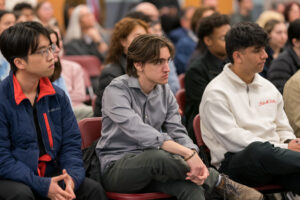
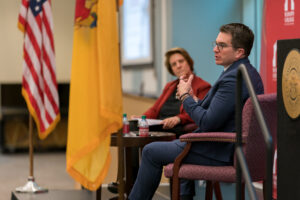

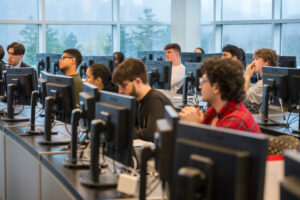

Follow Ramapo